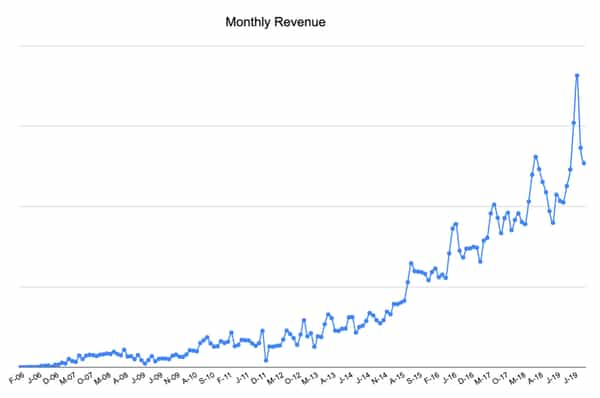5 Things Every Bootstrap Founder Should Know
If this graph could talk...oh the stories it would tell. The sleepless nights, the yelling matches, the hugs and hi-fives, the tears...it’s nearly impossible to describe our bootstrap journey.

And, it's just as difficult to explain how we managed to go from $12,000 in capital and absolutely zero experience in our space to a successful business inching towards $10M/year in revenue.
I started thinking about what we wish we would have known when bootstrapping our business, and I came up with these five things that I think every bootstrap founder should know.
#1 Forget a business plan...it’s a luxury you can’t afford.
Business plans are an exercise in futility. You can spend months drawing up a beautiful business plan, build all sorts of up-and-to-the-right financial models...years later you’ll look back and laugh at just how pointless that exercise was.
Starting your own business is like being a prize fighter. It’s a fight and you’re either going to win or you’re going to lose. And until the punches start flying, you have no idea how you’re going to react.
"Everyone has a plan...until they get punched in the mouth."
-Mike Tyson
Does that mean you shouldn’t have a plan? Of course not. You have to research the market and understand whether or not a business opportunity exists. And you need a plan to execute on. But get in the ring as fast as you can. Execute on your plan through talking with people in the real world, not sitting home alone night after night working on a powerpoint presentation no one is ever going to see.
In my opinion, business plans set a bad precedent: let’s sit around and think about stuff instead of actually do something. Have a bias towards action. Build, sell, iterate and keep punching...save the business plan for the MBA class.
#2 Make sure you are solving a problem.
Make sure you are solving and problem, and make sure you find someone who would be willing to pay for that solution to that problem immediately. You don’t have enough capital to orchestrate a wholesale pivot if you screw this up so you better make sure you’re bringing something to market that solves a problem. Even if you don’t know exactly how to solve the problem, make sure there’s at least a problem that could be solved better and that people would pay for. And you better find someone willing to pay for it quickly.
We gave ourselves three months and said ‘if we can’t get someone to buy this in 3 months, then we failed.’ Sure enough, in the third month we found buyers...we went from concept to launched product with paying customers in 90 days. It was ugly and it was crude, but we knew almost immediately it solved a problem and people would pay for it. Maybe that time frame isn’t feasible for you, but the immediacy of the plan should be the same: set a goal and come hell or high water, hit it.
#3 Know your strengths, and bring in co-founders that offset your weaknesses.
Bootstrapping a business requires being great at certain things and competent at everything. Virtually no one can check off every box. Make sure you have a deep understanding of where your strengths lie and where you are weak, then spend your time convincing others that compliment those weaknesses that together you can build a big business. Plus, going at it alone is brutal. Heck, as a group it’s brutal. But you need soldiers in the trenches with you. Times are going to be really tough and you need that support around you to keep running through those walls.
#4 Stop worrying about the perfect sales pitch...ask questions and listen.
You don’t know how to sell this product. You really don’t even know what you’re doing...that’s ok. Instead of spending all of your time worrying about the perfect pitch, spend all of your time trying to engage potential customers so that you can understand what problems they have, and how best you can solve those problems. Ask questions. Listen. Be sincere in your desire to help them.
We tried quickly iterating on a couple of products and then tried to shove them down people's throats. Guess what? It didn't work. Fortunately, we realized that quickly and changed course dramatically. We stopped selling and started listening. By simply asking questions, people told us exactly what they wanted and that's what we built.
#5 You are going to fail a lot, so learn to fail quickly.
You don’t have a board full of VC's that make sure you don’t make the same mistakes they’ve seen over and over. That means you’re going to make them. Get used to it...we’re 13 years in and we still make mistakes on a daily basis. The key is this: make them quickly and then have the humility to take an honest assessment of what happened so that you can do it better next time.
In the beginning, the losses will feel like your soul is being crushed. You have the weight of the world on you and when things don't go right, it can seem devastating. Here's what we've realized...often times, with the benefit of hindsight, some of the things we thought were horrible ended up being the best things to happen to us. So don't beat yourself up when it seems like you've failed. Find critical learnings from the experience so that they can help shape your company moving forward. Go 'fail'...a lot. But fail forward and keep punching!


